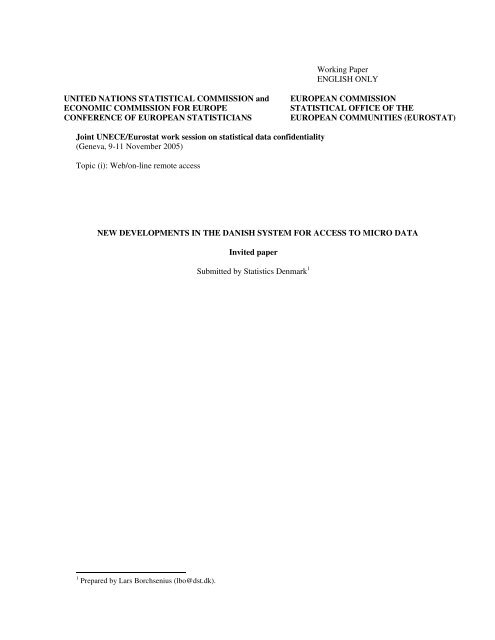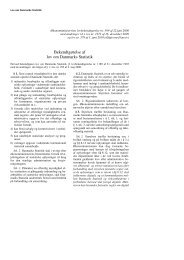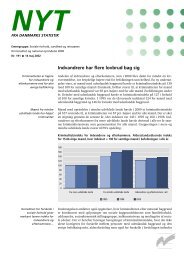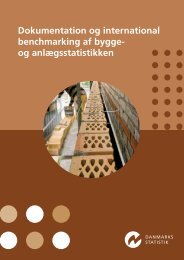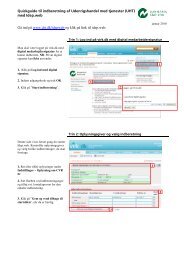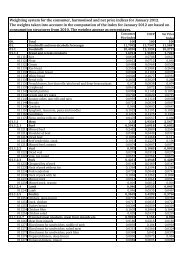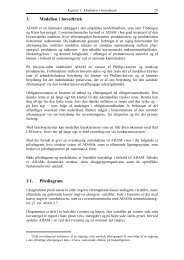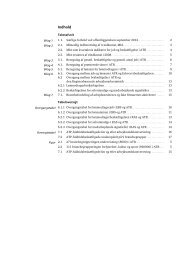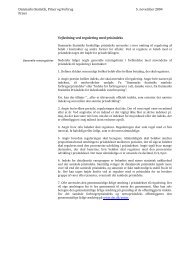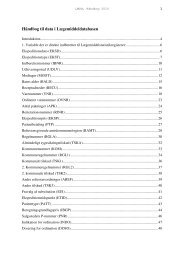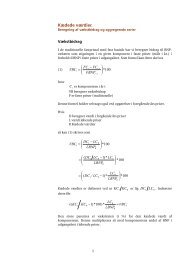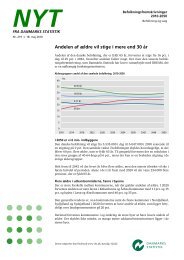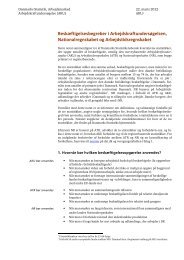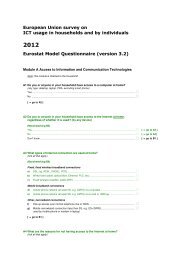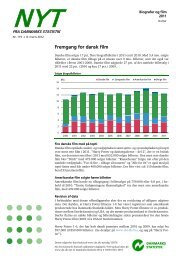New developments in the Danish System for Access to Micro Data
New developments in the Danish System for Access to Micro Data
New developments in the Danish System for Access to Micro Data
You also want an ePaper? Increase the reach of your titles
YUMPU automatically turns print PDFs into web optimized ePapers that Google loves.
Work<strong>in</strong>g Paper<br />
ENGLISH ONLY<br />
UNITED NATIONS STATISTICAL COMMISSION and<br />
ECONOMIC COMMISSION FOR EUROPE<br />
CONFERENCE OF EUROPEAN STATISTICIANS<br />
EUROPEAN COMMISSION<br />
STATISTICAL OFFICE OF THE<br />
EUROPEAN COMMUNITIES (EUROSTAT)<br />
Jo<strong>in</strong>t UNECE/Eurostat work session on statistical data confidentiality<br />
(Geneva, 9-11 November 2005)<br />
Topic (i): Web/on-l<strong>in</strong>e remote access<br />
NEW DEVELOPMENTS IN THE DANISH SYSTEM FOR ACCESS TO MICRO DATA<br />
Invited paper<br />
Submitted by Statistics Denmark 1<br />
1 Prepared by Lars Borchsenius (lbo@dst.dk).
2<br />
Summary<br />
NEW DEVELOPMENTS IN THE DANISH SYSTEM FOR ACCESS TO MICRO DATA<br />
Lars Borchsenius, Head of Division, Research Services, Statistics Denmark<br />
To facilitate registerbased research Statistics Denmark has given researchers access <strong>to</strong> de-identified micro<br />
data. The scheme has been changed from on-site <strong>to</strong> remote access through <strong>the</strong> Internet. Through <strong>the</strong> new<br />
scheme <strong>Danish</strong> researchers have a unique possibility <strong>to</strong> use micro data <strong>in</strong> <strong>the</strong>ir research.<br />
The paper presents <strong>the</strong> background concern<strong>in</strong>g <strong>the</strong> relevant legislation, <strong>the</strong> confidentiality pr<strong>in</strong>ciples of<br />
Statistics Denmark and <strong>the</strong> organisational framework.<br />
The paper presents <strong>the</strong> new rules <strong>for</strong> access <strong>to</strong> micro data. Accord<strong>in</strong>g <strong>to</strong> <strong>the</strong>se rules access <strong>to</strong> micro data<br />
can be granted <strong>to</strong> researchers and analysts <strong>in</strong> authorised environments. The use of micro data has<br />
<strong>in</strong>creased markedly under <strong>the</strong> new rules. As at 25 August, 2005, 132 such environments have been<br />
authorised with over 300 active researchers.<br />
Fur<strong>the</strong>rmore researchers <strong>in</strong> an authorised environment have been given (June 2005) <strong>the</strong> possibility of<br />
remote access <strong>to</strong> micro data from <strong>the</strong>ir private address when certa<strong>in</strong> conditions are fulfilled.<br />
The paper f<strong>in</strong>ally gives a presentation of <strong>the</strong> new technical solution.<br />
1. From surveys <strong>to</strong> registerbased statistics<br />
Denmark <strong>in</strong>troduced <strong>the</strong> Person Number (<strong>the</strong> Personal Identification Number) <strong>in</strong> 1968 and it was used <strong>in</strong><br />
a census <strong>for</strong> <strong>the</strong> first time at <strong>the</strong> Population and Hous<strong>in</strong>g Census <strong>in</strong> 1970. Accord<strong>in</strong>gly, this became <strong>the</strong><br />
first <strong>Danish</strong> register that uses <strong>the</strong> Person Number as an identification key. Dur<strong>in</strong>g <strong>the</strong> 1970s <strong>the</strong> first<br />
attempts were made <strong>to</strong> base <strong>the</strong> production of statistics on registers. In 1976 a register-based population<br />
census was conducted as a pilot project, but <strong>the</strong> registers were not sufficiently comprehensive and wellestablished<br />
until 1981, when a proper register-based population census was conducted conta<strong>in</strong><strong>in</strong>g most of<br />
<strong>the</strong> conventional population and hous<strong>in</strong>g census <strong>in</strong><strong>for</strong>mation.<br />
Like <strong>in</strong> <strong>the</strong> o<strong>the</strong>r Nordic countries, <strong>the</strong> person and bus<strong>in</strong>ess registers <strong>in</strong> Denmark <strong>to</strong>day cover a very<br />
substantial part of <strong>the</strong> production of statistics. The contents of <strong>the</strong> registers also cover many fields of<br />
research such as labour market research, sociology, epidemiology and bus<strong>in</strong>ess economics. The strength<br />
of <strong>the</strong> system is that <strong>the</strong> identification keys (person number, address, central bus<strong>in</strong>ess register number and<br />
property title number) render it possible <strong>to</strong> correlate <strong>the</strong> aggregated data both with<strong>in</strong> a specific year and<br />
longitud<strong>in</strong>ally across several years.<br />
2. Increased <strong>in</strong>terest <strong>in</strong> micro data<br />
In <strong>the</strong> mid-1980s, Statistics Denmark experienced an emerg<strong>in</strong>g <strong>in</strong>terest among various research<br />
environments and m<strong>in</strong>isterial analysis divisions <strong>in</strong> apply<strong>in</strong>g micro data (<strong>in</strong>dividual data) <strong>for</strong> research and<br />
analysis purposes. One reason was that <strong>the</strong> development <strong>in</strong> computer technology made it technically<br />
possible <strong>to</strong> process large amounts of data accord<strong>in</strong>g <strong>to</strong> advanced statistical models, such as multivariate<br />
models.<br />
These environments put pressure on Statistics Denmark <strong>to</strong> disclose micro data; a request that Statistics<br />
Denmark was unable <strong>to</strong> grant because of <strong>the</strong> rules of confidentiality lay down by <strong>the</strong> Management and<br />
Board of Statistics Denmark. On <strong>the</strong> o<strong>the</strong>r hand, it was evident already at that time that not only were <strong>the</strong><br />
registers of enormous importance <strong>to</strong> he production of statistics by Statistics Denmark, but <strong>the</strong>ir research<br />
potential was so great that it would be very valuable <strong>to</strong> actually utilise <strong>the</strong>m <strong>for</strong> research purposes.<br />
There<strong>for</strong>e, Statistics Denmark had <strong>to</strong> f<strong>in</strong>d a solution <strong>to</strong> <strong>the</strong> problem of access, which complied with <strong>the</strong><br />
exist<strong>in</strong>g legislation on registers while tak<strong>in</strong>g <strong>in</strong><strong>to</strong> account Statistics Denmark’s own confidentiality<br />
pr<strong>in</strong>ciples.
3<br />
Dur<strong>in</strong>g 2001 negotiations between Statistics Denmark, <strong>the</strong> M<strong>in</strong>istry of Research and <strong>the</strong> Research<br />
environment resulted <strong>in</strong> a sign<strong>in</strong>g a contract on <strong>the</strong> establishment of a special unit (<strong>the</strong> Research Service<br />
Unit) <strong>in</strong> Statistics Denmark with <strong>the</strong> special duty <strong>to</strong> improve researchers access <strong>to</strong> micro data through a<br />
better <strong>in</strong>frastructure and <strong>to</strong> lower <strong>the</strong> costs of us<strong>in</strong>g <strong>the</strong> data.<br />
3. Legislation<br />
With <strong>the</strong> <strong>in</strong>troduction of two acts on registers <strong>in</strong> 1979, Denmark saw <strong>the</strong> first statu<strong>to</strong>ry regulation<br />
concern<strong>in</strong>g, <strong>in</strong>ter alia, disclosure of micro data <strong>to</strong> researchers. As at 1 July 2000 <strong>the</strong>se acts were replaced<br />
by <strong>the</strong> Act on Process<strong>in</strong>g of Personal <strong>Data</strong> (lov om behandl<strong>in</strong>g af personoplysn<strong>in</strong>ger). The Act<br />
implements Directive 95/46/EC on <strong>the</strong> protection of <strong>in</strong>dividuals with regard <strong>to</strong> <strong>the</strong> process<strong>in</strong>g of personal<br />
data and <strong>the</strong> free movement of such data with<strong>in</strong> <strong>the</strong> European Union. The <strong>for</strong>mer Act primarily governed<br />
registration and disclosure of data <strong>in</strong> registers, while <strong>the</strong> new Act applies <strong>to</strong> all <strong>for</strong>ms of process<strong>in</strong>g of<br />
personal data. The new term, “process<strong>in</strong>g”, covers all types of process<strong>in</strong>g of personal data, <strong>in</strong>clud<strong>in</strong>g<br />
registration, s<strong>to</strong>r<strong>in</strong>g, disclosure, merg<strong>in</strong>g, changes, deletion, etc.<br />
Previously, <strong>the</strong> sett<strong>in</strong>g up of a register was subject <strong>to</strong> <strong>the</strong> so-called register provisions, <strong>in</strong>volv<strong>in</strong>g a ra<strong>the</strong>r<br />
time-consum<strong>in</strong>g and laborious process. These provisions have been abolished, and now <strong>the</strong> <strong>in</strong>dividual<br />
authority makes decisions <strong>in</strong> concrete cases on process<strong>in</strong>g; <strong>for</strong> example, <strong>the</strong> authority decides issues of<br />
disclosure of data <strong>for</strong> scientific purposes based directly on <strong>the</strong> provisions of <strong>the</strong> Act on <strong>the</strong> lawfulness of<br />
such disclosure.<br />
The new Act <strong>in</strong>troduced a duty of notification <strong>to</strong> <strong>the</strong> <strong>Danish</strong> <strong>Data</strong> Protection Agency. The purpose is <strong>to</strong><br />
enable <strong>the</strong> Agency <strong>to</strong> supervise <strong>the</strong> process<strong>in</strong>g of sensitive <strong>in</strong><strong>for</strong>mation carried out.<br />
Accord<strong>in</strong>gly, a scientific project <strong>in</strong>volv<strong>in</strong>g process<strong>in</strong>g of sensitive personal data is subject <strong>to</strong> notification<br />
<strong>to</strong> and approval by <strong>the</strong> <strong>Danish</strong> <strong>Data</strong> Protection Agency be<strong>for</strong>e such process<strong>in</strong>g can commence. This<br />
applies <strong>to</strong> all surveys, whe<strong>the</strong>r <strong>the</strong>y are conducted by a public adm<strong>in</strong>istration, <strong>in</strong>dividuals or enterprises.<br />
The Agency has laid down special provisions on security <strong>in</strong> connection with <strong>the</strong> process<strong>in</strong>g of sensitive<br />
data.<br />
All <strong>in</strong> all, <strong>the</strong> <strong>in</strong>troduction of <strong>the</strong> Act on Process<strong>in</strong>g of Personal <strong>Data</strong> has provided potentially more<br />
favourable conditions <strong>for</strong> register-based research <strong>in</strong> Denmark. In particular, public authorities’ basis <strong>for</strong><br />
disclos<strong>in</strong>g adm<strong>in</strong>istrative data <strong>for</strong> research purposes has been enhanced and simplified <strong>in</strong> terms of<br />
adm<strong>in</strong>istration, as <strong>the</strong>y no longer need <strong>to</strong> consult <strong>the</strong> <strong>Danish</strong> <strong>Data</strong> Protection Agency; personal data<br />
applied <strong>for</strong> statistical purposes may be disclosed and reused with <strong>the</strong> permission of <strong>the</strong> Agency; data from<br />
one private research project may be disclosed <strong>to</strong> ano<strong>the</strong>r project; <strong>the</strong>re is full access <strong>to</strong> fil<strong>in</strong>g of data <strong>in</strong> <strong>the</strong><br />
State archives; both private <strong>in</strong>dividuals and public authorities may process data on Person Numbers <strong>for</strong><br />
scientific or statistical purposes; fur<strong>the</strong>rmore, <strong>the</strong> Act now explicitly stipulates that <strong>the</strong> data subject’s right<br />
of access <strong>to</strong> personal data shall not apply where data are processed solely <strong>for</strong> scientific purposes.<br />
In addition <strong>to</strong> <strong>the</strong> Act on Process<strong>in</strong>g of Personal <strong>Data</strong>, <strong>the</strong> <strong>Danish</strong> Public Adm<strong>in</strong>istration Act<br />
(Forvaltn<strong>in</strong>gsloven) is of relevance. Under this Act, a public authority may impose a duty of nondisclosure<br />
on persons outside <strong>the</strong> public adm<strong>in</strong>istration concern<strong>in</strong>g <strong>the</strong> data disclosed. Statistics Denmark<br />
has applied this provision <strong>in</strong> connection with researchers’ access <strong>to</strong> micro data, although no disclosure <strong>in</strong><br />
a <strong>for</strong>mal sense is made. <strong>Data</strong> - even anonymised data - must be treated as confidential. Breach of <strong>the</strong> duty<br />
of non-disclosure is punishable by simple detention or imprisonment.<br />
4. Confidentiality pr<strong>in</strong>ciples of Statistics Denmark<br />
As it appears from <strong>the</strong> above, current legislation permits disclosure, <strong>to</strong> a wide extent, of personal data <strong>for</strong><br />
scientific purposes. However, <strong>the</strong> authority <strong>in</strong> question ultimately decides whe<strong>the</strong>r disclosure may take<br />
place, mean<strong>in</strong>g that <strong>the</strong> authority may take o<strong>the</strong>r issues <strong>in</strong><strong>to</strong> consideration even if <strong>the</strong> <strong>Danish</strong> <strong>Data</strong><br />
Protection Agency has approved <strong>the</strong> disclosure of data.
4<br />
That is what Statistics Denmark has decided <strong>to</strong> do. This decision has been made so that <strong>the</strong> <strong>in</strong>dividual<br />
citizen or enterprise can be certa<strong>in</strong> that <strong>the</strong> data supplied directly or <strong>in</strong>directly <strong>to</strong> Statistics Denmark do<br />
not fall <strong>in</strong><strong>to</strong> <strong>the</strong> hands of any unauthorised persons. In <strong>the</strong> op<strong>in</strong>ion of Statistics Denmark <strong>the</strong> risk of<br />
irreparable damage <strong>to</strong> <strong>the</strong> production of statistics outweighs <strong>the</strong> consideration <strong>for</strong> more or less convenient<br />
access <strong>to</strong> data by <strong>the</strong> <strong>in</strong>dividual researcher.<br />
Thus, <strong>the</strong> fundamental pr<strong>in</strong>ciple is that data must not be disclosed where <strong>the</strong>re is an imm<strong>in</strong>ent risk that an<br />
<strong>in</strong>dividual person or <strong>in</strong>dividual enterprise can be identified. This does not only apply <strong>to</strong> identified data,<br />
such as Person Numbers, but also <strong>to</strong> de-identified data, s<strong>in</strong>ce such data are usually so detailed that<br />
identification can be made.<br />
S<strong>in</strong>ce Statistics Denmark also considers it important that data can be applied <strong>for</strong> scientific purposes,<br />
special schemes <strong>for</strong> researchers have been set up.<br />
5. Chang<strong>in</strong>g of scheme from on-site arrangement <strong>for</strong> external researchers at Statistics Denmark <strong>to</strong><br />
remote access through <strong>the</strong> Internet<br />
S<strong>in</strong>ce its overrid<strong>in</strong>g pr<strong>in</strong>ciple is not <strong>to</strong> disclose <strong>in</strong>dividual data, Statistics Denmark set up a scheme <strong>in</strong><br />
1986 <strong>for</strong> <strong>the</strong> on-site arrangement <strong>for</strong> external researchers at Statistics Denmark. Under this scheme,<br />
researchers got access <strong>to</strong> anonymised register data from a workstation at <strong>the</strong> premises of Statistics<br />
Denmark. Statistics Denmark creates <strong>the</strong> relevant datasets on <strong>the</strong> basis of <strong>the</strong> researcher’s project<br />
description, <strong>the</strong> general pr<strong>in</strong>ciple be<strong>in</strong>g that <strong>the</strong> dataset should not be more comprehensive than necessary<br />
<strong>for</strong> carry<strong>in</strong>g out <strong>the</strong> project (<strong>the</strong> “need <strong>to</strong> know” pr<strong>in</strong>ciple). The researcher signs an agreement which<br />
stipulates that data are confidential and that <strong>in</strong>dividual data must not be removed from <strong>the</strong> premises of<br />
Statistics Denmark.<br />
From 2001 <strong>the</strong> users of Statistics Denmark’s researcher schemes has been given access <strong>to</strong> datasets from<br />
<strong>the</strong>ir own workplaces. The permission is restricted <strong>to</strong> specially authorised research and analysis<br />
environments. Fur<strong>the</strong>rmore researchers <strong>in</strong> an authorised environment has been given (June 2005) <strong>the</strong><br />
possibility of remote access <strong>to</strong> micro data from <strong>the</strong>ir private address when certa<strong>in</strong> conditions are fulfilled.<br />
A research or analysis environment can apply <strong>for</strong> an authorisation from Statistics Denmark. As at 25<br />
August, 2005, 132 environments had been granted authorisation. The word<strong>in</strong>g of <strong>the</strong> authorisation<br />
appears from Appendix 1.<br />
Until now <strong>the</strong> remote access has not been granted <strong>for</strong> all datasets; particularly data on enterprises are<br />
assessed carefully <strong>to</strong> avoid any problems of confidentiality. It has been emphasised that <strong>the</strong> data consist<br />
of samples. If <strong>the</strong> researchers request access <strong>to</strong> <strong>to</strong>tal populations, <strong>the</strong> content of variables must be limited.<br />
With this new development <strong>the</strong> rules <strong>for</strong> grant<strong>in</strong>g authorisation <strong>to</strong> micro data are of course of outmost<br />
<strong>in</strong>terest.<br />
6. Rules <strong>for</strong> access <strong>to</strong> micro data<br />
<strong>Access</strong> <strong>to</strong> micro data can only be granted <strong>to</strong> researchers and analysts <strong>in</strong> authorised environments.<br />
Authorisations can be granted <strong>to</strong> public research and analysts environments (e.g. <strong>in</strong> universities, sec<strong>to</strong>r<br />
research <strong>in</strong>stitutes, m<strong>in</strong>istries etc) and <strong>to</strong> research organizations as a part of a charitable organization.<br />
With<strong>in</strong> <strong>the</strong> private sec<strong>to</strong>r follow<strong>in</strong>g user groups can be granted authorisation if <strong>the</strong>y have a stable research<br />
or analyst’s environment (with a responsible manager and with a group of researchers/analysts):<br />
1. Nongovernmental organisations<br />
2. Consultancy firms
5<br />
3. Enterprises. However s<strong>in</strong>gle enterprises can not have access <strong>to</strong> micro data with enterprise data<br />
In order <strong>to</strong> grant an authorisation, Statistics Denmark will evaluate <strong>the</strong> proposed organization carefully<br />
and especially when it is an organization or firm with<strong>in</strong> <strong>the</strong> private sec<strong>to</strong>r Statistics Denmark will look at<br />
credibility of <strong>the</strong> applicant (as ownership, educational standard among <strong>the</strong> staff and <strong>the</strong> research done <strong>for</strong><br />
o<strong>the</strong>rs).<br />
Statistics Denmark will not grant authorization <strong>to</strong> s<strong>in</strong>gle persons. Fur<strong>the</strong>rmore Media organizations are<br />
excluded from <strong>the</strong> scheme.<br />
The “need <strong>to</strong> know” pr<strong>in</strong>ciple is still <strong>in</strong> <strong>for</strong>ce.<br />
Researchers can have access <strong>to</strong> relevant bus<strong>in</strong>ess data after <strong>the</strong> “need <strong>to</strong> know” pr<strong>in</strong>ciple. Only very few<br />
bus<strong>in</strong>ess data are excluded from remote access.<br />
7. Foreign researcher?<br />
Only <strong>Danish</strong> research environments are granted authorisation as Statistics Denmark is not able effectively<br />
<strong>to</strong> en<strong>for</strong>ce a contract abroad. Foreign researchers from well established research centres can have access<br />
<strong>to</strong> <strong>Danish</strong> micro data from <strong>the</strong> on-site arrangement <strong>in</strong> Copenhagen or Århus. Visit<strong>in</strong>g researchers can<br />
have remote access from a workplace <strong>in</strong> <strong>the</strong> <strong>Danish</strong> research <strong>in</strong>stitution dur<strong>in</strong>g <strong>the</strong>ir stay <strong>in</strong> Denmark and<br />
under <strong>the</strong> <strong>Danish</strong> authorisation.<br />
8. Organisational framework<br />
The scheme is adm<strong>in</strong>istered centrally by <strong>the</strong> Division of Research Services. The staff of this unit also<br />
create a substantial part of <strong>the</strong> <strong>in</strong>terdiscipl<strong>in</strong>ary datasets and have a general (authorized) access <strong>to</strong> all<br />
relevant data <strong>in</strong> Statistics Denmark <strong>in</strong> order <strong>to</strong> reduce <strong>the</strong> adm<strong>in</strong>istrative and bureaucratic work. The<br />
scheme requires close cooperation between <strong>the</strong> Division of Research Services and <strong>the</strong> <strong>in</strong>dividual<br />
divisions. The advantage of such central organisation is that <strong>the</strong> <strong>in</strong>dividual researcher is fully aware of<br />
whom <strong>to</strong> negotiate with and who is responsible <strong>for</strong> <strong>the</strong> dataset supplied.<br />
In 1996, Statistics Denmark opened a small branch <strong>in</strong> Århus, Jutland, <strong>to</strong> grant researchers west of <strong>the</strong><br />
Great Belt an opportunity <strong>to</strong> use <strong>the</strong> scheme on equal terms with researchers <strong>in</strong> Copenhagen.<br />
9. Research databases<br />
As <strong>the</strong> researchers almost <strong>in</strong>variably request datasets l<strong>in</strong>k<strong>in</strong>g <strong>in</strong><strong>for</strong>mation from several <strong>in</strong>dividual registers<br />
<strong>in</strong> terms of both contents and time, <strong>the</strong> creation of specific datasets <strong>for</strong> a project often <strong>in</strong>volves<br />
considerable work by Statistics Denmark and often considerable costs <strong>for</strong> <strong>the</strong> researcher.<br />
To reduce <strong>the</strong> cost of datasets <strong>for</strong> research purposes and solve special data problems, Statistics Denmark<br />
has set up a number of research databases. These databases are hardly ever used <strong>in</strong> <strong>the</strong> actual production<br />
of statistics, but are first and <strong>for</strong>emost a k<strong>in</strong>d of <strong>in</strong>termediate products <strong>for</strong> <strong>the</strong> benefit of <strong>the</strong> research<br />
process.<br />
The most frequently applied research database is <strong>the</strong> Integrated <strong>Data</strong>base <strong>for</strong> Labour Market Research<br />
(IDA). One reason <strong>for</strong> creat<strong>in</strong>g <strong>the</strong> database was <strong>to</strong> solve a difficult problem of def<strong>in</strong>ition: Identity of<br />
enterprises over time, a task that <strong>in</strong>dividual researchers were unable <strong>to</strong> handle <strong>for</strong> reasons of both time<br />
and fund<strong>in</strong>g. N<strong>in</strong>e <strong>to</strong> ten man-years were spent on <strong>the</strong> task, which was funded by <strong>the</strong> <strong>Danish</strong> Social<br />
Science Research Council (Statens Samfundsvidenskabelige Forskn<strong>in</strong>gsråd) and Statistics Denmark.<br />
S<strong>in</strong>ce <strong>the</strong> establishment of IDA, Statistics Denmark has handled <strong>the</strong> updat<strong>in</strong>g of <strong>the</strong> database aga<strong>in</strong>st user<br />
charges.
6<br />
O<strong>the</strong>r research databases <strong>in</strong>clude <strong>the</strong> Demographic <strong>Data</strong>base, <strong>the</strong> Fertility <strong>Data</strong>base, <strong>the</strong> Prevention<br />
Register (health data), <strong>the</strong> Social Research Register, etc. As <strong>the</strong> names imply, <strong>the</strong> databases cover many<br />
specialist fields: economy, labour market research, social research, medic<strong>in</strong>e, epidemiology, etc. The last<br />
development, where <strong>the</strong> number of users is grow<strong>in</strong>g at a rapid rate, is <strong>the</strong> Register of Medic<strong>in</strong>al product<br />
Statistics hold<strong>in</strong>g <strong>in</strong><strong>for</strong>mation on doc<strong>to</strong>rs’ prescriptions of medic<strong>in</strong>e sold by <strong>the</strong> pharmacies <strong>in</strong> Denmark.<br />
10. Considerable growth<br />
From <strong>the</strong> modest beg<strong>in</strong>n<strong>in</strong>gs <strong>in</strong> 1986, <strong>the</strong> use of micro data has <strong>in</strong>creased markedly <strong>for</strong> researchers at<br />
Statistics Denmark. In 1997, 71 researchers used <strong>the</strong> on-site arrangement, while <strong>in</strong> 2005 under <strong>the</strong><br />
scheme <strong>for</strong> remote access through <strong>the</strong> Internet <strong>the</strong> figure had risen <strong>to</strong> more than 300.<br />
11. Study datasets<br />
Statistics Denmark has prepared some study datasets, so far based on <strong>the</strong> IDA database, <strong>for</strong> study<br />
programmes <strong>in</strong> economics/labour market policy and <strong>in</strong>terdiscipl<strong>in</strong>ary data material <strong>for</strong> sociology studies.<br />
These datasets follow a few thousand persons over time accord<strong>in</strong>g <strong>to</strong> a number of variables. Where<br />
possible, <strong>the</strong> data are scrambled so that <strong>the</strong> actual register data have been changed <strong>in</strong> ascend<strong>in</strong>g or<br />
descend<strong>in</strong>g order by a simple ma<strong>the</strong>matical function. However, <strong>the</strong> fundamental characteristics of <strong>the</strong><br />
data have been preserved. In this way, students get an opportunity <strong>to</strong> try out statistical models on realistic<br />
data.<br />
Except <strong>for</strong> <strong>the</strong> above, Statistics Denmark has not applied scrambl<strong>in</strong>g procedures or special group<strong>in</strong>g<br />
techniques <strong>to</strong> <strong>the</strong> data that are made available <strong>to</strong> <strong>the</strong> researchers. The data appear as <strong>in</strong> <strong>the</strong> basic registers.<br />
12. The technical solution<br />
The technical solution is based on <strong>the</strong> use of <strong>the</strong> Internet conf. <strong>the</strong> flow chart at <strong>the</strong> end of this paper.<br />
The relevant micro data are produced by <strong>the</strong> staff <strong>in</strong> Statistics Denmark and <strong>the</strong> de-identified micro data<br />
are transferred <strong>to</strong> <strong>the</strong> disk s<strong>to</strong>rage connected <strong>to</strong> <strong>the</strong> special Unix servers. These Unix servers are only used<br />
by researchers and are separated from <strong>the</strong> production network.<br />
Communications via <strong>the</strong> Internet is encrypted by means of a so-called RSA SecurID card, a component<br />
that secures Internet communications aga<strong>in</strong>st unauthorised access. In practice <strong>the</strong> researcher rents a<br />
password key (a <strong>to</strong>ken) from Statistics Denmark. The <strong>to</strong>ken ensures that only <strong>the</strong> authorised person<br />
obta<strong>in</strong>s access <strong>to</strong> <strong>the</strong> computer system.<br />
A farm of Citrix Servers ensures that <strong>the</strong> researchers from <strong>the</strong>ir own workplace can “see” <strong>the</strong> Unix<br />
environment <strong>in</strong> Statistics Denmark. All data process<strong>in</strong>g is actually done <strong>in</strong> Statistics Denmark and data<br />
cannot be transferred from Statistics Denmark <strong>to</strong> <strong>the</strong> researcher’s computer. The researcher can work<br />
with <strong>the</strong> data quite freely and can make new datasets from <strong>the</strong> orig<strong>in</strong>al data sets. The limit is of course <strong>the</strong><br />
amount of disk space. Statistics Denmark has just <strong>in</strong>creased <strong>the</strong> <strong>to</strong>tal amount of disk space considerably.<br />
All results from <strong>the</strong> researchers computer work can be s<strong>to</strong>red <strong>in</strong> a special file and such pr<strong>in</strong><strong>to</strong>uts are sent<br />
<strong>to</strong> <strong>the</strong> researchers by e-mail. This is a cont<strong>in</strong>uous process (every five m<strong>in</strong>utes) and has shown <strong>to</strong> be quite<br />
effective. The advantage <strong>to</strong> Statistics Denmark is that all e-mails are logged at Statistics Denmark and<br />
checked by <strong>the</strong> Research Service Unit. If <strong>the</strong> unit f<strong>in</strong>d pr<strong>in</strong><strong>to</strong>uts with <strong>to</strong>o detailed data, contact is taken <strong>to</strong><br />
<strong>the</strong> researcher <strong>in</strong> order <strong>to</strong> agree on details of <strong>the</strong> level of output. No severe violation of <strong>the</strong> rules, establish<br />
<strong>in</strong> <strong>the</strong> authorisation <strong>for</strong>mula, has taken place.<br />
.
Appendix 1<br />
Statistics Denmark<br />
AUTHORISATION<br />
Statistics Denmark hereby grants<br />
[Institution] represented by [Chief Researcher]<br />
Authorisation <strong>for</strong><br />
Remote electronic access <strong>to</strong> selected datasets at Statistics Denmark<br />
Remote <strong>Access</strong> via <strong>the</strong> Internet is subject <strong>to</strong> <strong>the</strong> follow<strong>in</strong>g terms:<br />
1. A project description must be submitted, which states <strong>the</strong> project objectives and renders it<br />
possible <strong>to</strong> select <strong>the</strong> data required <strong>for</strong> successful project execution.<br />
2. Based on <strong>the</strong> project and data description, Statistics Denmark decides whe<strong>the</strong>r external electronic<br />
access <strong>to</strong> data can be granted <strong>for</strong> <strong>the</strong> specified project. If <strong>the</strong> authorisation is not granted, <strong>the</strong> researcher is<br />
referred <strong>to</strong> use <strong>the</strong> ord<strong>in</strong>ary scheme <strong>for</strong> <strong>the</strong> on-site arrangement <strong>for</strong> external researchers at Statistics<br />
Denmark.<br />
3. The researcher <strong>to</strong> whom external electronic access is granted shall sign a special agreement with<br />
Statistics Denmark, cf. appendix.<br />
4. All datasets are confidential, cf. §27(3) of <strong>the</strong> <strong>Danish</strong> Public Adm<strong>in</strong>istration Act and §152 of <strong>the</strong><br />
<strong>Danish</strong> Crim<strong>in</strong>al Code.<br />
5. The researcher obta<strong>in</strong>s access <strong>to</strong> make batch runs on Statistics Denmark’s special researcher<br />
mach<strong>in</strong>es (UNIX system) from one or more PCs specially assigned <strong>for</strong> that purpose <strong>in</strong> <strong>the</strong><br />
research/analysis environment. <strong>Access</strong> is denied <strong>for</strong> batch runs from remote PCs, PCs at home or PCs<br />
which cannot be properly supervised.<br />
6. Only <strong>the</strong> client software assigned by Statistics Denmark may be applied <strong>in</strong> connection with <strong>the</strong><br />
RSASecurID card provided. A PC connected <strong>to</strong> Statistics Denmark may not be made available <strong>to</strong><br />
unauthorised persons, and when <strong>the</strong> user leaves <strong>the</strong> PC, <strong>the</strong> PC must be ei<strong>the</strong>r shut down or disconnected,<br />
i.e., protected from any unauthorised use.<br />
7. The password of <strong>the</strong> <strong>in</strong>dividual researcher is personal and strictly confidential.<br />
8. The researcher may not, directly or <strong>in</strong>directly, download <strong>the</strong> dataset or any datasets derived <strong>the</strong>re<br />
from. All transfers of output <strong>for</strong> pr<strong>in</strong>t<strong>in</strong>g or fur<strong>the</strong>r statistical process<strong>in</strong>g (<strong>in</strong> spreadsheets or similar) must<br />
be executed <strong>in</strong> accordance with <strong>the</strong> guidel<strong>in</strong>es and methods laid down by Statistics Denmark. Statistics<br />
Denmark will create a log file of such authorised transfers. Fur<strong>the</strong>rmore, <strong>in</strong>dividual records may not be<br />
pr<strong>in</strong>ted, and all output must be aggregated <strong>to</strong> an extent that elim<strong>in</strong>ates any risk of direct or <strong>in</strong>direct<br />
identification of persons or enterprises. The researcher may not attempt <strong>to</strong> make such identification.<br />
9. Statistics Denmark shall be entitled at unannounced visits <strong>to</strong> check that <strong>the</strong> rules of this<br />
agreement are observed.<br />
10. The person sign<strong>in</strong>g this agreement on behalf of <strong>the</strong> research/analysis environment shall ensure<br />
that publications by <strong>the</strong> environment do not conta<strong>in</strong> any <strong>in</strong><strong>for</strong>mation that may identify <strong>in</strong>dividual persons<br />
or <strong>in</strong>dividual enterprises.<br />
11. The person sign<strong>in</strong>g this agreement on behalf of <strong>the</strong> research/analysis environment undertakes<br />
personally <strong>to</strong> supervise or <strong>to</strong> appo<strong>in</strong>t a person <strong>to</strong> supervise that <strong>the</strong> provisions of this agreement are<br />
observed.<br />
12. In case of breach of <strong>the</strong> provisions of this agreement, <strong>the</strong> researcher <strong>in</strong> breach will be excluded<br />
from us<strong>in</strong>g any researcher schemes of Statistics Denmark permanently or <strong>for</strong> a period of not less <strong>the</strong>n<br />
three years. Fur<strong>the</strong>rmore, <strong>in</strong> <strong>the</strong> case of breach hereof, this authorisation will be withdrawn <strong>for</strong> a period.
This agreement, which is signed <strong>in</strong> two copies, enters <strong>in</strong><strong>to</strong> <strong>for</strong>ce on [date] and may be term<strong>in</strong>ated by<br />
ei<strong>the</strong>r party at three months’ notice.<br />
8


